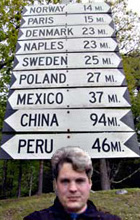Subscribe to the blog 
|
 |
 |
 |
 |
 |
Find a Flight Consider a Consolidator Rent a Car Pick a Railpass Book a Vacation Reserve a Room Get Gear |
|
||||||
|
People Who Live on Glass Islands (cont'd) << back Those who stay even longer can begin to get under the skin of La Serenissima and see the city for what it truly is, in all its gorgeous, chaotic, cut-gem splendor, a true wonder of the world and marvel of engineering over nature and yet at the same time a thoroughly shameless self-caricature of opera-warbling gondoliers and merchants earnestly hawking Carneval masks and glass trinkets, all hand-made — in Taiwan. A most serene decaying beauty. Marie-France Bailey has lived here for 30 years. But now, even having achieved the prestigious post of PR director at the Londra Palace Hotel (one of those sought-after addresses on Riva degli Schiavoni overlooking the bay into which the Grand Canal empties, and where I spent my first night in Venice sampling the lap of luxury), she has become disillusioned with Venice and is currently plotting her departure — back to Montreal, or perhaps to her father's homeland of Paris, or just anywhere else. "This is not the same city I fell in love with," she sighed resignedly toward the end of a fine meal we shared in the hotel's recommendable restaurant. "Venice has changed; Venice is different. I don't enjoy it anymore." She looked downright glum at the sentiment. But if you catch her at the right moment, Marie-France still betrays a trace romantic view of the city — however tarnished by time and jaded by constant close contact. When we talked about hopping on the vaporetto to visit the outlying islands of Murano, Burano, Torcello, her eyes sparkled as she agreed that was a fine way to spend a day. Then she took me up to the tiny roof terrace, the highest point on the whole Riva. Here, she confided, she once had a special dinner prepared and served to Sting and his guest ("A simply lovely, wonderful man," she nodded decisively). "And what a beautiful view, all before you at your feet..." her hand swept vaguely over the Venetian panorama. I could tell by the tone of her voice that she was clearly not speaking in brochure-speak for the benefit of the travel writer now. She was merely expressing her opinion. She sighed as she tucked her elbows against her body in the cold breeze and swiveled to take in the 360-degree vista of the swooping Grand Canal, the helter-skelter terracotta rooftops and tipsy marble belltowers of the city, the expanse of the bay before us, its tiny wavelets shopping the sunlight into so many glittering yellow diamonds. "You can see all of Venice..." She trailed off with a faraway look in her eyes, and after a few moments of gazing unfocusedly, her breath trailing out of her mouth in a frosty wisp drawn away from the bay on the stiff breeze, she excused herself to return inside out of the cold while I remained to snap a few pictures. Sandra, on the other hand, who did a commendable job over the past year of renovating the one-star Casa Verardo Hotel at Ponte Storto (in the oddly little-touristed tangle of streets just east of San Marco), sat me down in the private room off the pensione's frescoed main hall with a glass of white Veneto wine to explain, in between dashing downstairs to check in guests, why she's getting out of the hotel business and selling her little hotel next year. "Everybody wants to try and get into the game in 2000, for the Giubileo," she told me. "And they all want to charge ridiculous rates," she went on, explaining that her soon to be ex-colleagues have been trying to excuse the usurious prices by 'modernizing' the hotels, which means adding minibars and satellite TVs in the rooms but little else. But modernization isn't always the best thing, Sandra argues, and in fact is in many ways contrary to what Venice (and her loyal visitors) wants, needs, or, indeed, should have to put up with. Venice, and the people who love it, needs the antique, the old-fashioned, the pensione. Sandra summed up Venice and its contemporary conundrum: "Venice is not a modern city. Venice is decadent. It doesn't understand the modern and doesn't accept change. You can't make too many changes here because you're not standing on solid ground; you're walking on water. And yet these profiteers would change it to try and make money. People, yes, can adapt and can become modern, but the city, it is too delicate. It's like fine blown glass — which is so very beautiful and refined. But it's so thin you could shatter it with just one shout. And around here, lately, everyone is screaming." Copyright
© 1999 by Reid Bramblett |

